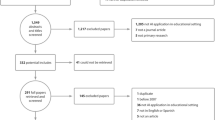Conclusion
Key issues in medical education do not, as is often apparently believed, exist in isolation, and cannot be dealt with in isolation. The issues are only symptoms; they are indicative of deeper relationships which exist within a system of teaching and earning. Rather than deal with the sympoms, it is better to understand the nature of the system and what is giving rise to the symptoms. The systems approach to teaching and learning not only gives an appropriate framework for analysing need, designing solutions and evaluating outcome, but of putting together within a manageable structure the various pieces of what might previously have appeared to be an educational jigsaw.
Ideas about the nature of learning and the development of cognitive skills, coupled with the development of interactive methods of delivery make it possible for medical educators to help their students achieve the high level medical problem-solving abilities identified in analysis of required competences.
Similar content being viewed by others
References
Walton H. Overview of themes in medical education. In: Goodland S.Education for the Professions, Society for Research into Higher Education, 1984.
Charvat J, Mc Guire C, Parsons V.A Review of the Nature and Uses of Examinations in Medical Education, Public Health Paper No. 36, Geneva, World Health Organisation, 1968.
W.H.O.Competency-Based Curriculum Development in Medical Education. Public Health Paper No. 68, World Health Organisation, 1978.
McGuire C. A process approach to the construction and analysis of medical examinations.Journal of Medical Education 1963; 38 (7): 556–563.
Harden RM, Gleeson FA. Assessment of clinical competence using an objective structured clinical examination (OSCE).Medical Education, 1979; 13: 41–54.
Barrows HS. Multiple stations. In: Hart IR, Harden RM, eds.Further Developments in Assessing Clinical Competence, Montreal, Heal Publications, 1987.
Romberg TA, Carpenter TP. Research on teaching; and learning mathematics, In: Wittrock MC, ed.Handbook of Research on Teaching, 3rd edition, MacMillan Publishing Co., 1986: 850–873.
Entwistle NJ, Ramsden P.Understanding Student Learning, London, Croom Helm, 1983.
Marton F, Saljo R. On qualitative differences in learning.British Journal of Educational Psychology 1976; 46: pp 4–11 & 115–127.
Watkins & Mattie 1981.
Ramsden 1992.
Ballstaedt SP, Mandl H.Influencing Depth of Processing in Reading. Paper presented at the Annual Meeting of the American Educational Research Association, Chicago, April 1985.
Biggs JB, Rihn BA. The effects of intervention on deep and surface approaches to learning. In: Kirby JR, ed.Cognitive Strategies and Educational Performance, London: Academic Press, 1984.
Hale Report.University Teaching Methods, London, HMSO, 1964.
Nickerson RS, Perkins DN, Smith EE.The Teaching of Thinking, Lawrence Erlbaum Associates, 1985.
Gunn MCA.The Development of Scientific Thinking in Egyptian Children Through Non-formal Educational Settings Utilising Teacher-Mediated Resource-Based Learning Materials. Unpublished Med dissertation, University of Dundee, 1984.
Barker J, Tucker RN, eds.The Interactive Learning Revolution. London: Kogan Page, 1990.
Bunzell MJ, Morris SK.Multimedia Applications Development, New York: McGraw-Hill, 1992.
Wilson JD.Student Learning in Higher Education, London, Croom Helm, 1981.
Cox KR, Ewan CE.The Medical Teacher, Churchill Livingstone, 1982.
Hallet DH. Understanding students who don't understand maths. In: Akst G, ed.Improving Mathematics Skills, Jossey-Bass Inc. 1981: 3–7.
Lochhead J. Problem solving for rote learners. In: Akst G, ed.Improving Mathematics Skills, Jossey-Bass Inc., 1981: 12–26.
Author information
Authors and Affiliations
Rights and permissions
About this article
Cite this article
Stewart, A. Key issues in medical education: Implications of educational technology trends. Indian J Pediatr 60, 729–738 (1993). https://doi.org/10.1007/BF02751040
Issue Date:
DOI: https://doi.org/10.1007/BF02751040




